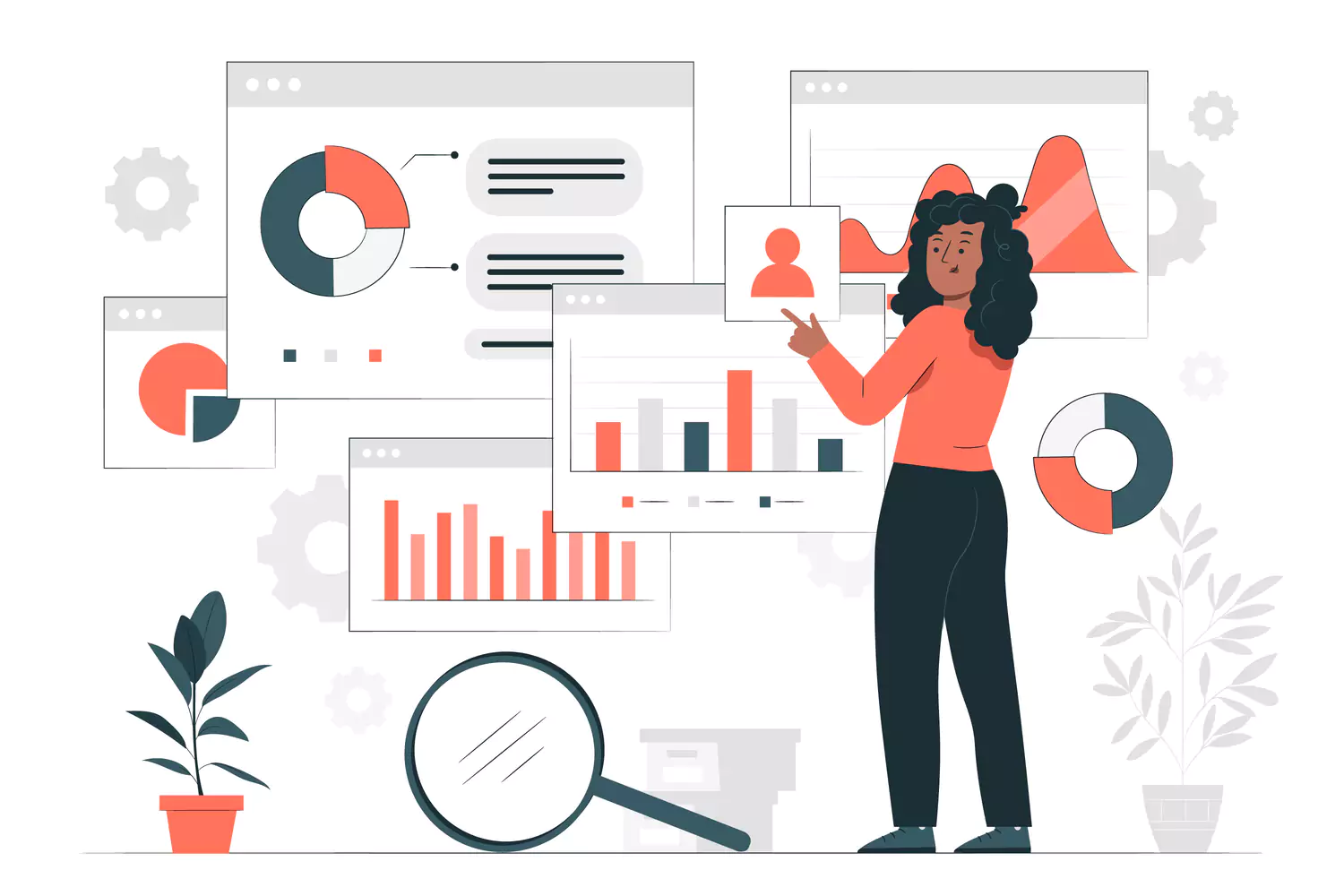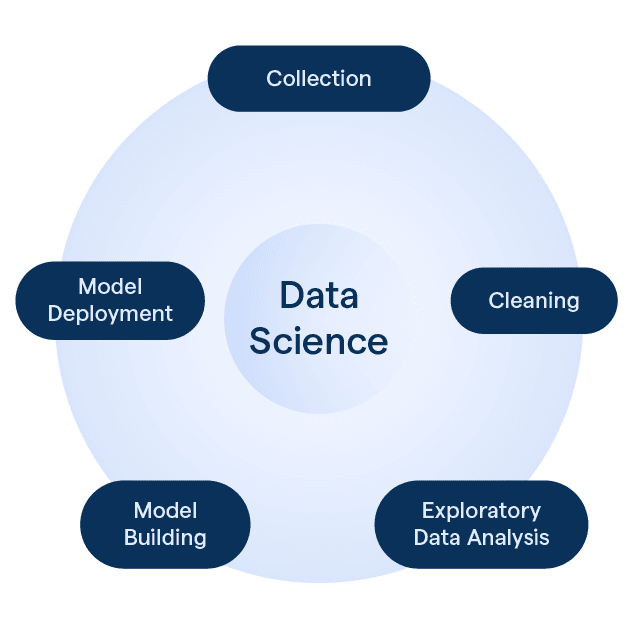What is Data Science?
Data science is a multidisciplinary field that aims to extract value from data in various forms. It combines aspects of statistics, computer science, and domain-specific knowledge to collect, clean, and analyze data to make informed decisions and predictions. Data scientists use various techniques such as machine learning, data mining, and predictive analytics to analyze large sets of data and extract patterns or insights. They also employ visualization tools to represent data in a way that is easily understandable. Data science is widely used across industries, including healthcare, finance, marketing, and technology, for optimizing processes, improving customer experiences, and driving innovation.
Why is Data Science Important?
Informed Decision Making
Hey, so you know how crucial making the right choices can be, right? Well, Data Science is like your wingman in decision-making. With its powers, you can analyze data and uncover insights, which ultimately leads to smarter decisions. Be it for businesses or personal choices, having that edge is essential in this fast-paced world.
Efficiency Improvement
Next up, let’s talk about doing things better and faster. Data Science helps in identifying patterns and trends. This information can be a game-changer, as it allows businesses and individuals to streamline their processes. Saving time and resources is always a win, don't you think?
Customized Experiences
Ever wondered how your favorite streaming service knows just what to recommend? That's Data Science at work! It understands user preferences and behavior. So, whether it's shopping, entertainment, or services, you get tailor-made experiences. Feels good to be understood, doesn’t it?
Predicting Future Trends
Imagine having a crystal ball. Data Science is kinda like that. It helps you forecast what's coming. For businesses, this means being ahead of the game. For individuals, it could mean knowing what skills to learn or where to invest. Knowledge of the future can be a powerful ally.
Solving Complex Problems
Lastly, let’s not forget that our world is full of complex problems. Data Science is like a toolbox full of versatile tools. It helps in breaking down complex issues and finding solutions. Whether it's fighting diseases or optimizing logistics, Data Science can be the hero we all need.
Applications of Data Science
Healthcare

Data science is used to predict disease outbreaks, develop personalized treatment plans, and optimize hospital resource allocation.
Finance
Data scientists analyze market trends, detect fraudulent activities, and develop risk management strategies to help businesses make informed decisions.
Marketing
Data science helps create targeted marketing campaigns, predict customer behavior, and optimize pricing strategies to maximize revenue.
Transportation
Data science is employed to optimize routing and scheduling, improve traffic management, and develop autonomous vehicle technology.
E-commerce
Data science enables personalized product recommendations, improves inventory management, and enhances customer service by analyzing user behavior and purchase patterns.
Manufacturing
Data scientists optimize production processes, predict equipment failures, and improve product quality through advanced analytics and predictive maintenance.
Sports
Data science is used to analyze player performance, develop game strategies, and enhance injury prevention measures by leveraging player statistics and historical data.
Who Benefits from Data Science?
Businesses and Organizations
Data science helps businesses make data-driven decisions, optimize processes, and gain a competitive edge by uncovering hidden patterns and trends in their data.
Governments
Data science enables governments to develop evidence-based policies, optimize resource allocation, and tackle complex social issues by analyzing large-scale data sets.
Healthcare Providers
Data science assists healthcare providers in delivering personalized care, predicting disease outbreaks, and improving patient outcomes through data-driven insights.
Researchers and Academics
Data scientists play a crucial role in advancing knowledge across various fields by developing new methodologies, analyzing complex data, and uncovering novel insights.
Consumers
Data science benefits consumers by enabling personalized experiences, such as tailored product recommendations, targeted advertising, and improved customer service.
Non-profit Organizations
Data science helps non-profits optimize their operations, maximize their impact, and make data-informed decisions to better serve their target communities.
Environment and Sustainability
Data science contributes to environmental protection and sustainability efforts by analyzing large-scale data to identify patterns, trends, and potential solutions for pressing ecological challenges.
When to Use Data Science?
Predictive Analytics
Use data science when you want to forecast future trends, identify patterns, and make data-driven predictions to inform decision-making processes.
Optimizing Processes
Apply data science to improve efficiency, streamline operations, and minimize costs by analyzing data from various sources and identifying areas for improvement.
Personalization
Utilize data science to create personalized experiences for customers, such as tailored product recommendations, targeted advertising, and customized content.
Risk Management
Leverage data science to assess and mitigate risks, detect anomalies, and develop data-driven strategies to enhance security and minimize potential threats.
Decision Support
Employ data science to support informed decision-making by providing actionable insights, identifying opportunities, and uncovering hidden patterns in data.
Customer Segmentation
Use data science to analyze customer data, identify distinct groups with similar characteristics, and develop targeted marketing strategies to better serve each segment.
Anomaly Detection
Apply data science to detect unusual patterns, identify outliers, and monitor performance metrics, enabling timely intervention and proactive problem-solving.
How Does Data Science Work?
Understanding the Problem
First and foremost, you need to understand the problem you're trying to solve. This is the stage where you'll be asking questions, identifying the objectives and constraints of the project. It’s important to have a clear goal to ensure that the efforts you put into data collection and analysis are aimed in the right direction.
Data Collection

Now, you need to get your hands on the data. This could be through databases, APIs, web scraping or any other sources. The quality and quantity of the data you collect are vital. Ensure that the data is relevant, accurate, and sufficient to make reliable conclusions.
Data Cleaning
Not all data is ready for prime time. You'll often find that the data you’ve collected is messy or incomplete. That's where data cleaning comes in. You’ll remove inconsistencies, handle missing values, and make sure the data is formatted correctly. This is crucial for ensuring the integrity of your analyses and models.
Exploratory Data Analysis
Before diving into complex models, take some time to explore and understand your data. This is about summarizing the main characteristics, often with visual methods. It helps you identify patterns, anomalies, or relationships that can guide you in selecting the appropriate modeling techniques.
Suggested Reading:
Building Models
Here comes the magic! In this phase, you use algorithms and statistical models to analyze the data. The choice of model depends on the problem you’re trying to solve. You’ll be training your model with a subset of data, tweaking it, and assessing its performance.
Communicating Results
Finally, it’s all about communicating your findings. You need to present the results in a way that’s easy for the audience to understand. This could include charts, graphs, and summaries. More importantly, provide insights and recommendations that can guide decision-making. This is where the value of your data science work truly shines.
Techniques and Algorithms Used in Data Science
Linear Regression
Linear regression is a fundamental algorithm used to model the relationship between a dependent variable and one or more independent variables, making it useful for predicting numerical values.
Decision Trees
Decision trees are a popular technique for classification and regression tasks, as they recursively split data into subsets based on feature values, resulting in a tree-like structure.
Clustering
Clustering algorithms, such as K-means and hierarchical clustering, group data points with similar characteristics together, aiding in pattern recognition and data organization.
Principal Component Analysis (PCA)
PCA is a dimensionality reduction technique that transforms data into a new coordinate system, preserving the most significant features while reducing computational complexity.
Naive Bayes
Naive Bayes is a probabilistic classification algorithm based on Bayes' theorem, which assumes independence among features, making it efficient for text classification and spam filtering.
Neural Networks
Neural networks are a powerful class of algorithms inspired by the human brain, capable of learning complex patterns and solving problems in image recognition, natural language processing, and more.
Support Vector Machines (SVM)
SVM is a supervised learning algorithm used for classification and regression tasks, which finds the optimal hyperplane that best separates data points from different classes.
Challenges in Data Science
Data Quality
Ensuring data quality is a significant challenge, as data scientists must deal with missing, inconsistent, or noisy data, which can impact the accuracy of their models.
Data Integration
Combining data from various sources and formats can be difficult, as data scientists must harmonize and preprocess data to create a unified and consistent dataset for analysis.
Scalability
Handling large-scale datasets and complex models can be computationally intensive, requiring data scientists to develop scalable solutions that can efficiently process vast amounts of data.
Privacy and Security
Protecting sensitive data and maintaining user privacy is crucial, as data scientists must adhere to strict regulations and ethical guidelines while working with personal or confidential information.
Model Interpretability
Creating interpretable models is essential for gaining trust and understanding the underlying decision-making process, but highly accurate models like neural networks can often be difficult to interpret.
Feature Selection
Identifying the most relevant features from a large set of variables can be challenging, as data scientists must carefully select the right features to improve model accuracy and avoid overfitting.
Talent Shortage
The growing demand for data science professionals has led to a talent shortage, making it difficult for organizations to find and retain skilled data scientists with the necessary domain expertise.
Frequently Asked Questions (FAQs)
What Exactly is Data Science?
Data Science is a field that combines statistics, programming, and domain knowledge to extract insights and knowledge from structured and unstructured data.
How is Machine Learning Related to Data Science?
Machine Learning, a subset of Data Science, involves using algorithms to analyze data, learn from it, and make predictions or decisions without being explicitly programmed.
What Are Some Common Tools Used in Data Science?
Data scientists often use Python, R, SQL, Tableau, and Jupyter Notebooks for data manipulation, analysis, visualization, and reporting.
What's the Difference Between Data Science and Big Data?
Data Science is about extracting insights from data, while Big Data focuses on processing and storing a large volume of data, which can be analyzed by data science.
How Can I Start a Career in Data Science?
Begin with learning statistics, programming (Python or R), and data manipulation. Next, build a portfolio with projects and consider getting a certification or degree in Data Science.


